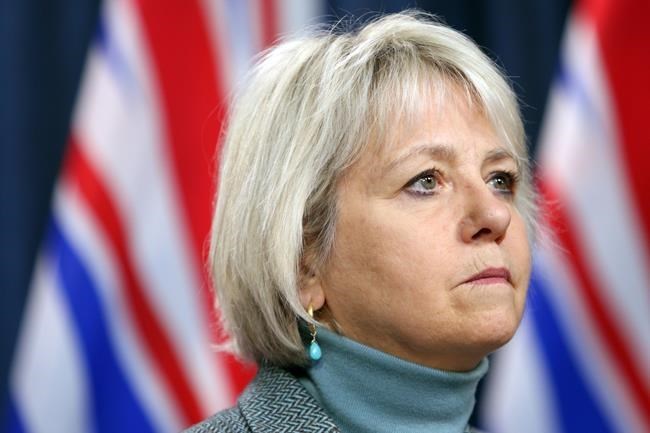VANCOUVER — British Columbia has reduced the requirement to self-isolate after testing positive for COVID-19 to five days for fully vaccinated people without symptoms.
A mask must be worn around others for an additional five days after leaving self-isolation, provincial health officer Dr. Bonnie Henry told a news conference Friday.
"After five days, if your symptoms have resolved or are mostly improved, you can go back to activities in the community wearing a mask," she said.
It doesn't mean that every single person will be through their infectious period within five days, Henry said, but the "vast majority of people" will be.
"If you continue to feel unwell after five days, or you still have a fever, then you must continue to self-isolate until your symptoms resolve," she said.
People who haven't been vaccinated are still required to self-isolate for 10 days. Previously, vaccinated people were required to isolate for seven days.
The decision to reduce the self-isolation requirement comes as cases of the Omicron variant surge across the province, causing a higher number of health-care workers to stay home from work due to illness, Henry said.
B.C. reported 3,795 new cases of COVID-19 on Friday. There were more than 20,800 active infections across the province, including 220 people in hospital.
Three more people have died, pushing the province's death toll to 2,423.
Omicron appears to have a shorter incubation period, which means people are infectious earlier and that the illness tends to resolve more quickly, Henry said.
Henry cautioned that people who have recently left self-isolation must be careful not to visit long-term care facilities or attend gatherings for the following five days.
Starting Saturday, visits to long-term care and assisted living facilities will also be limited to essential visitors in response to recent outbreaks. Henry said the restriction will be re-evaluated on Jan. 18, when other COVID-19 rules are set to expire, and it will be in place for the shortest possible period of time.
The Health Ministry reported two new outbreaks in long-term care facilities on Friday for a total of 15 outbreaks in health-care settings, including three in hospitals.
Henry discouraged New Year's Eve parties, which are prohibited under public health orders,saying it's "inevitable that somebody that you are with is incubating or is able to spread this virus and may not even realize it themselves."
The B.C. government is also aiming to speed up the rollout of booster doses of COVID-19 vaccines after initially prioritizing people at higher risk of severe illness.
People aged 18 to 59 who received their second dose of vaccine at least six months beforehand will soon start receiving invitations to book their third shot, said Dr. Penny Ballem, executive lead of B.C.'s COVID-19 immunization program.
The province has been working with health authorities to build immunization capacity to address a backlog of about 800,000 people under the age of 60 who have already passed the six-month mark, Ballem told the news conference.
"Our first priority in the next few days is to address that group," she said.
While immunity fades after six months, Ballem said many people infected with Omicron after receiving two doses have experienced a brief, milder illness.
Just over 88 per cent of eligible B.C. residents aged five and up have received their first dose of a vaccine, while nearly 83 per cent have had their second shot and 21 per cent of eligible adults have received a third dose, the province said.
This report by The Canadian Press was first published Dec. 31, 2021.
The Canadian Press




